Clifford Garstang's Blog, page 114
December 21, 2011
Winter Solstice
 Technically, the winter solstice comes shortly after midnight tonight (U.S. East Coast), but we usually think of the 21st as the shortest day of the year, so . . . Happy Solstice!
Technically, the winter solstice comes shortly after midnight tonight (U.S. East Coast), but we usually think of the 21st as the shortest day of the year, so . . . Happy Solstice!Did you know that the Romans designated December 25th as the Solstice? (Hmm, what else is celebrated on that date?) The date moved in the 16th Century when the Gregorian calendar was adopted. More fun facts about the solstice here and here and here.
Published on December 21, 2011 04:33
December 20, 2011
Vote for New Yorker Story of the Year
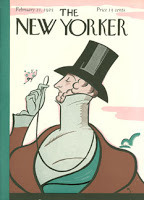 Only 11 days left to vote for your favorite New Yorker story of 2011. Choose from among Atwood, Munro, Coover, Englander, Marcus, Hadley, Saunders, Erdrich, Barnes, and Groff. The winner will be announced on New Year's Day.
Only 11 days left to vote for your favorite New Yorker story of 2011. Choose from among Atwood, Munro, Coover, Englander, Marcus, Hadley, Saunders, Erdrich, Barnes, and Groff. The winner will be announced on New Year's Day.For links to descriptions of all ten stories, go to The New Yorker Story of the Year: The Top Ten.
Published on December 20, 2011 04:44
December 17, 2011
Prime Number Magazine Print Annual--Coming Soon!

We are getting close! The first Print Annual edition of Prime Number Magazine is nearly ready to go to print, and we are extremely excited. The volume will include "Editors' Selections" from the first four issues of the magazine: 2, 3, 5, and 7. The book will be available for order some time in January on the magazine's website, from our publisher, Press 53, and from all the usual online outlets.
Our first year has been terrific and we want to thank all of our contributors and readers.
And now, I'm very pleased to announce the lineup for Editors' Selections Volume 1:
Poetry
James HarmsSarah LindsayJake Adam YorkSusan Laughter MeyersMark Smith-SotoLola HaskinsTimothy BlackRobert Hill LongTheodore WorozbytRachel HadasErica DawsonBarry SpacksRuth FoleyEmilie LindemanCatherine StaplesM.A. SchaffnerWilliam Reichard
Nonfiction
Maris VeniaFaye Rapoport DesPresStephen J. West
Fiction
Kevin WilsonScott Loring SandersSusan TepperAnne Leigh ParrishJon TrobaughRichard WileyMeagan CieslaDennis GinozaVirginia PyeJohn FlynnDan MoreauDaniel MeltzerLinda Stewart-OatenPaul HetzlerDavid Meischen[image error]
Published on December 17, 2011 12:17
December 16, 2011
Tips for Writers: Target your Submissions
 You've written a story/poem/essay and now you want to get itpublished. There are a lot of literary magazines out there. Most of them you'venever even heard of. There are hundreds, if not thousands, of them. So how doyou decide where to submit your work?
You've written a story/poem/essay and now you want to get itpublished. There are a lot of literary magazines out there. Most of them you'venever even heard of. There are hundreds, if not thousands, of them. So how doyou decide where to submit your work?Good question. The answer depends on your priorities. Ifmaking money is important to you, then you might want to limit your submissionsonly to contests or magazines that pay for work they publish. To get thatinformation, I recommend Duotrope.com.If money isn't so important, and all you want to do is get your work up on theInternet so you can share a link with family and friends, Duotrope.com can alsopoint the way to even the most obscure online magazines. NewPages.com is another resource that canbe helpful in finding magazines that you might not already know about.
But many writers want to have their work appear in themagazines that publish the best work. That alone constitutes recognition thatsome of us crave, and suggests that your work is worthy of attention by a wideraudience. That's my theory, anyway. I want my fiction to be in the bestmagazines possible. For me, it's a career issue. The best magazines (generallyin print, although not all) will get the work noticed, even though it is alsotrue that online (generally less highly regarded) magazines may be more widelyread.
So, how to find the best magazines. My very own PerpetualFolly Pushcart Prize Ranking (Fiction) is a great place to start. (There'sa separate list for Nonfiction,and I'm in the process of developing one for Poetry.) This list ranks literarymagazines by how many Pushcart Prizes and Special Mentions each has won overthe last ten years. This is recognition by respected writers and editors whodetermine the awards. So, using this methodology, I aim my own submissions highon that list, and work my way down until they stick. Because the list also haslinks to the websites of the magazines, it's a good way to explore submissionguidelines, obtain sample copies, and subscribe to magazines that are ofinterest.
Because, after all, the best way to get an idea of whereyour work will fit is to read the magazines where you might want it to appear.It's pointless to send the same story to every magazine on the list, becauseeach magazine has a different sensibility. That's what we mean by targeting,but you can't target without knowing something about the magazines.[image error]
Published on December 16, 2011 14:28
December 13, 2011
The New Yorker Story of the Year: The Top Ten
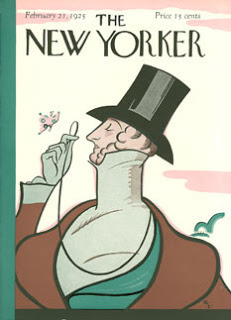 The nominations are closed and it is now time to begin the voting for The New Yorker Story of the Year.
The nominations are closed and it is now time to begin the voting for The New Yorker Story of the Year.Voting will occur through the poll in the right sidebar of this blog. Votes in the comments section will not be counted. Votes sent to me by email or through some other method will not be counted. Voting will close at midnight on December 31, and I will announce the winner on January 1.
Through a process that combined my own favorites (I did, after all, read all of the stories) and reader nominations, I have determined a list of the Top Ten stories of the year. Several writers this year had multiple stories nominated: Alice Munro, Robert Coover, Ben Marcus, George Saunders. So that they wouldn't be competing against themselves, and to be as inclusive as possible, I allowed only one story per author in the Top Ten.
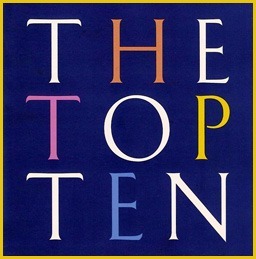 The Top Ten New Yorker Stories of the Year are (in chronological order):
The Top Ten New Yorker Stories of the Year are (in chronological order):"The Years of My Birth" by Louise Erdrich (January 10)
"Going for a Beer" by Robert Coover (March 14)
"Clever Girl" by Tessa Hadley (June 6)
"Home" by George Saunders (June 13 & 20)
"Above and Below" by Lauren Groff (June 13 & 20)
"Gravel" by Alice Munro (June 27)
"Homage to Hemingway" by Julian Barnes (July 4)
"What Have You Done?" by Ben Marcus (August 8)
"What We Talk About When We Talk About Anne Frank" by Nathan Englander (December 12)
"Stone Mattress" by Margaret Atwood (December 19 & 26)
Published on December 13, 2011 15:54
Latest Update to Prime Number Magazine: 13.5
 Prime Decimals 13.5 is now live! The latest issue features flash fiction by Curtis Smith, Christy Strick, and Cezarija Abartis, as well as poetry by Nandini Dhar, Steven D. Schoeder, and Wendy Vardaman.
Prime Decimals 13.5 is now live! The latest issue features flash fiction by Curtis Smith, Christy Strick, and Cezarija Abartis, as well as poetry by Nandini Dhar, Steven D. Schoeder, and Wendy Vardaman.Issue 13 has one more update, due out on New Year's Eve. Issue 17 will debut in mid January.
Prime Number Magazine is also open for submissions for future issues. We're specifically looking for fiction, creative nonfiction, poetry, short drama, book reviews, interviews, craft essays, and cover art. Please visit the Submission Guidelines for more information.
Published on December 13, 2011 05:14
December 12, 2011
The New Yorker: "Stone Mattress" by Margaret Atwood
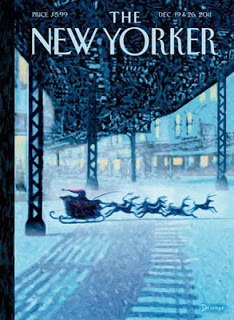
December 19 & 26, 2011: "StoneMattress" by Margaret Atwood
The New Yorker's Holiday Present to you—a story (and quite agood one, at that) that isn't behind the paywall. This story reminds mesomewhat of the Alice Munro story, "Axis,"from earlier in the year, since it involves the passage of a long time afteryouthful sex, and also deals with a geological formation that plays at least asymbolic role in the story.
Here, sixty-something Verna is on an Arctic cruise, thinkingof getting back in the game after taking some time off following the death ofher fourth husband. She's calculating and smart, and she knows she's betterstaying away from the married men. But she notices one, a "Bob," and makes herapproach.
Although he doesn't remember her, she remembers him quite well—heraped her some 50 years earlier when she was 14. She'd been a sheltered girl upuntil that point, but she became pregnant, had to give the child up, and neverrecovered. She begins to plot her revenge . . .
Don't read the Q&Awith Margaret Atwood until you've read the story, but be sure and read it.There isn't much more to say about it beyond what Atwood says. And I won'tdiscuss it further to avoid spoilers. (Usually in New Yorker stories that doesn'tmatter much, but it does in this one.)
Published on December 12, 2011 16:09
Indie vs. Self Publishing
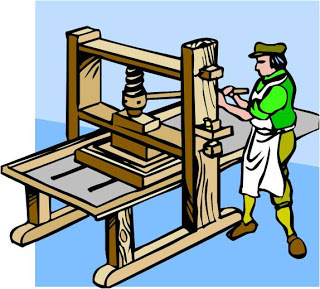 I just came across a very thorough discussion of a new terminology debate that has arisen in the publishing world. Increasingly, authors who have published their books themselves have abandoned the term "self-published," which has some negative connotations, in favor of "indie published" which, so the argument goes, sounds better. But it sounds better because true indie publishing is different from self-publishing, in my view, and self-published authors are using the term in order to hide something.
I just came across a very thorough discussion of a new terminology debate that has arisen in the publishing world. Increasingly, authors who have published their books themselves have abandoned the term "self-published," which has some negative connotations, in favor of "indie published" which, so the argument goes, sounds better. But it sounds better because true indie publishing is different from self-publishing, in my view, and self-published authors are using the term in order to hide something.An independent publisher is a small or micro-press that isn't part of a publishing monolith. My book, In an Uncharted Country, was published by Press 53, a small independent publisher. They will also publish my new book, coming out in Fall 2012. That is indie publishing. But an author who publishes by him or herself, even if that author sets up a publishing company for the purpose of publishing the author's book, is self-published. And while some self-published books are just fine--especially those that have undergone professional editing--many (most?) are not. I actually have nothing against self-publishing. There are lots of reasons an author might choose to go that route. But as a reader I am wary of such books because I've seen too many that are simply awful.
So, I object to this blurring of the line between "self-published" and "indie-published." Nonetheless, I recommend this article: Self-publishing and the Definition of an Indie Author.
Published on December 12, 2011 10:20
December 9, 2011
Press 53 Special Offers! (And get a postcard from me . . .)
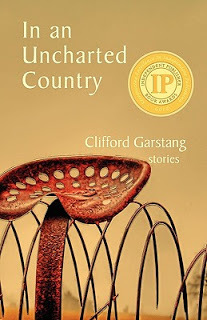 Press 53 has some great deals this holiday season.
Press 53 has some great deals this holiday season.First, there's Books for Soldiers. Buy a book from Press 53 (like mine, for example, In an Uncharted Country, or choose from the many other terrific story or poetry collections, novels, memoirs, or anthologies) and at no extra cost to you, Press 53 will send a book to an active duty soldier. It's a great gesture on the Press's part, and I hope lots of people will support it.
Second, there's the Holiday Special deal, where for a mere $53 (plus shipping), you can get a bundle of books: 5 story collections, 6 poetry titles, or choose from several other combinations. That's a lot of books. Another great deal.
Plus, if you buy my book, let me know and I'll send you an autographed postcard of the book's cover!
Published on December 09, 2011 08:44
Tips for Writers: Finding Time to Write

I used to have a great job. It was very demanding, and Ioften brought work home with me. I also traveled a lot (long overseas trips).So, even though I had completed a draft of a novel before I took that job, andmanaged a little bit of revision while I was in the job, I used the job as anexcuse for not getting any new writing done. Too hard. Too busy. Too tired.
I feel kind of guilty about that now. Lots of people manageto hold down demanding jobs and still write. On the other hand, I did manage tocreate an opportunity for myself to put that life behind me in order to writeall the time, so that's a good thing.
The point is, lack of time is an excuse, but it's not areason for not writing. I'm reading a book right now called Writing a Novelwith Scrivener by David Hewson. It's about using the software Scrivener toorganize the pieces of a novel (which I'm doing for my new project). In achapter called "Work in Progress," Hewson relates questions that he getsconstantly from people, including this one: "I can't find the time to write mybook, what do you suggest?"
His answer: "Get up earlier, work later."
Hah! It's true. That's it. Get up earlier, work later. Excellent advice and my tip of the week.
Another answer, though, is "Get organized, and get focused."And with that I refer you to my post from earlier this week on how to "Bring theRetreat Home."
Published on December 09, 2011 03:00



